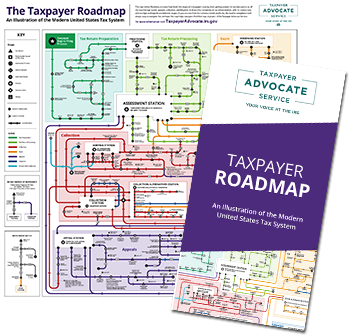Published: | Last Updated: May 19, 2023
Notice CP49, Overpayment Adjustment – Offset
View our interactive tax map to see where you are in the tax process. It could help you navigate your way through the IRS.
View our interactive tax map to see where you are in the tax process. It could help you navigate your way through the IRS.

Your tax return may show you’re due a refund from the IRS. However, if you owe a federal tax debt from a prior tax year, the IRS may keep (offset) some or all your tax refund to pay your debt. The CP49 notice is mailed to taxpayers to notify them that the IRS used all or part of their refund to pay a federal tax debt owed.
This notice or letter may include additional topics that have not yet been covered here. Please check back frequently for updates.
The refund amount that you were expecting has changed. All or part of that refund was applied to an unpaid federal tax debt from a prior tax year, reducing or eliminating the balance due for that prior tax year.
The IRS received an income tax return using your name, Social Security number (SSN) or individual taxpayer identification number (ITIN). That return indicated an overpayment to be refunded to you; however, an unpaid balance remained from a prior tax year. This unpaid balance could be from a return you filed or a tax increase based on unreported income or the examination of a prior year return.
The first thing to do is to check the return address to be sure it’s from the IRS and not another agency.
If you didn’t file the return claiming the refund that was applied to your unpaid federal tax debt: Call the IRS immediately, as you may be a victim of tax-related identity theft. See Taxpayer Guide to Identity Theft | irs.gov.
If you want to authorize a third party (such as a certified public accountant, attorney, or enrolled agent) to represent you, complete and send the IRS a Form 2848, Power of Attorney and Declaration of Representative. Alternatively, if you want to give a third party limited authority to review and receive your confidential tax information complete and send the IRS a Form 8821, Tax Information Authorization.
What if I Disagree?
What happens if the refund used didn’t pay the full amount I owed, and I can’t pay the rest?
If you can’t pay the full amount due after your refund was applied, pay as much as you can now to limit penalties and interest. Visit http://www.irs.gov/payments to consider online payment options, or visit payment plan to set up monthly installments if you are unable to pay in full. If you need additional assistance, call the IRS at the toll-free number on the top right corner of your notice.
If you already have an installment agreement or payment plan in place, please continue making payments to that agreement.
You can go to www.irs.gov, call the IRS tax law phone line, (800-829-1040), or use the IRS forms and publications.

Understanding your Notice or Letter
IRS.gov has resources for understanding your notice or letter.
Get Help topics
Browse common tax issues and situations at TAS Get Help
If you still need help
The Taxpayer Advocate Service (TAS) is an independent organization within the IRS that helps taxpayers and protects taxpayers’ rights. We can offer you help if your tax problem is causing a financial difficulty, you’ve tried and been unable to resolve your issue with the IRS, or you believe an IRS system, process, or procedure just isn’t working as it should. If you qualify for our assistance, which is always free, we will do everything possible to help you.
Visit www.taxpayeradvocate.irs.gov or call 1-877-777-4778.
Low Income Taxpayer Clinics (LITCs) are independent from the IRS and TAS. LITCs represent individuals whose income is below a certain level and who need to resolve tax problems with the IRS. LITCs can represent taxpayers in audits, appeals, and tax collection disputes before the IRS and in court. In addition, LITCs can provide information about taxpayer rights and responsibilities in different languages for individuals who speak English as a second language. Services are offered for free or a small fee. For more information or to find an LITC near you, see the LITC page on the TAS website or Publication 4134, Low Income Taxpayer Clinic List. This Publication is also available online at www.irs.gov or by calling the IRS at 1-800-829-3676.
Related Notices and Letters
Notice CP49, Overpayment Adjustment – Refund Applied to Other Tax Debt (Offset)